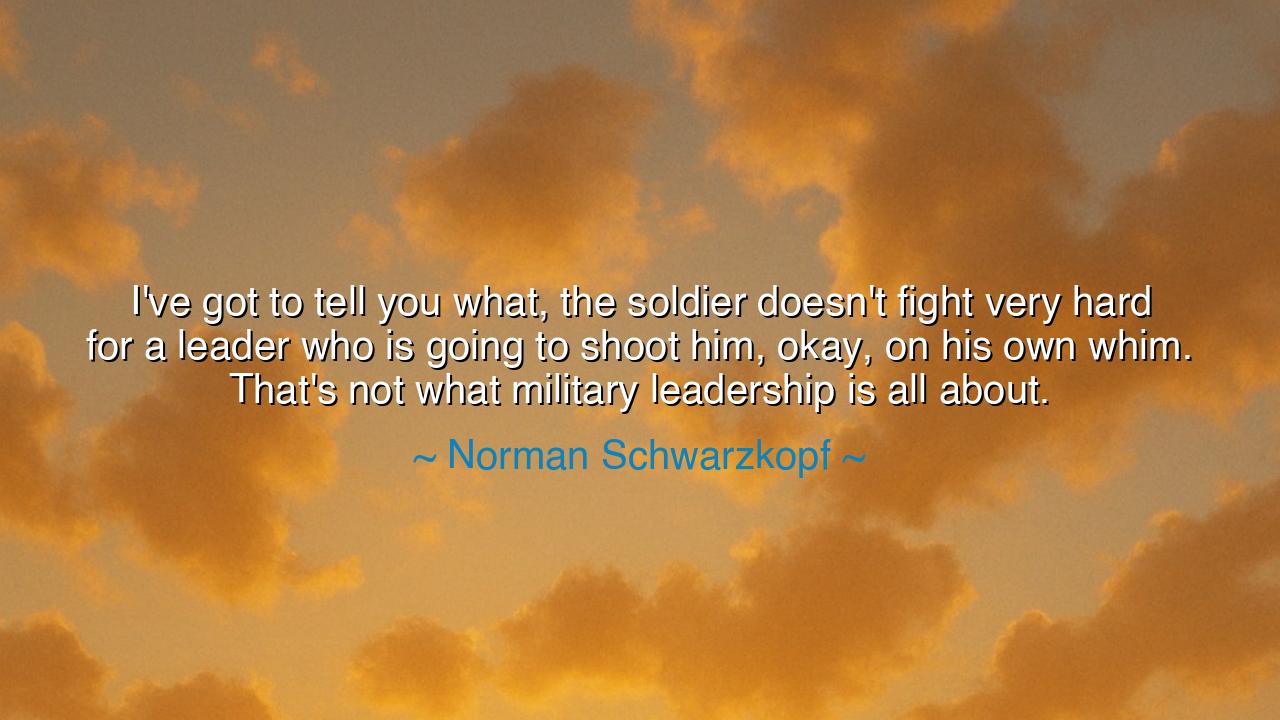
I've got to tell you what, the soldier doesn't fight very hard
I've got to tell you what, the soldier doesn't fight very hard for a leader who is going to shoot him, okay, on his own whim. That's not what military leadership is all about.






The words of General Norman Schwarzkopf, the commander of Desert Storm, echo with the thunder of battlefield wisdom: “I’ve got to tell you what, the soldier doesn’t fight very hard for a leader who is going to shoot him, okay, on his own whim. That’s not what military leadership is all about.” In these words, he speaks with blunt clarity of a truth as old as war itself—that loyalty is not forged through fear and cruelty, but through trust, respect, and shared sacrifice. A soldier may obey the tyrant, but he will never give his heart to him. True courage is given only to the leader who values the lives of his men.
The origin of this wisdom comes from Schwarzkopf’s long years in the United States Army, where he witnessed both noble and poor examples of command. He knew from experience that an army is not sustained by discipline alone, nor by the cold edge of fear, but by the bond between leader and follower. Military leadership, to him, meant responsibility first and foremost—the willingness to bear the burdens of command without abusing its power. He reminds us that a soldier fights not for glory, nor even for abstract ideals, but for the leader who stands with him, protects him, and does not squander his life.
History proves this truth. Consider Alexander the Great, who marched with his men across deserts and mountains, sharing their hardships and eating their rations. His soldiers followed him to the ends of the earth not because they feared him, but because they believed he would not waste their lives without purpose. Contrast this with commanders of cruelty, such as during the First World War, when soldiers were sent mindlessly “over the top” into slaughter by generals far from the trenches. The result was mutiny, despair, and a collapse of trust in leadership. As Schwarzkopf declared, no soldier fights bravely for a leader who uses him as a pawn, to be discarded at whim.
The story of Julius Caesar offers another lesson. When his legions stood at the Rubicon, they did not hesitate to cross with him into civil war. Why? Because Caesar had fought beside them, rewarded them, and cared for their welfare. They were not mere tools of conquest; they were his companions in victory and survival. His command was not built upon threats of death, but upon loyalty earned through respect. This is the heart of Schwarzkopf’s teaching: men will give their lives willingly, but not cheaply, and never for a leader who treats them as expendable.
O children of tomorrow, hear this well: leadership is not tyranny. Authority does not grant the right to abuse, but the duty to protect. The leader who commands by whim, who sacrifices his people recklessly, may hold power for a time, but his reign will rot from within. Fear can compel obedience, but only love and respect inspire true devotion. And in the hour of greatest trial, when courage is needed most, devotion is stronger than fear.
The lesson is luminous. Whether in war, in governance, or in the quiet battles of daily life, to lead is to serve. A true leader does not destroy his people to exalt himself, but exalts himself to protect his people. Those who follow you must know, beyond doubt, that you value their lives, their trust, and their dignity. Only then will they give their full strength to your cause.
Practical action lies before you: if you hold command, whether over many or over a few, lead with justice, not cruelty. Earn trust by sharing burdens, not by wielding threats. Protect those who depend on you, and never waste their efforts or their lives. And if you are led, measure your leaders not by their words, but by their care for those they serve. For in every field—be it battlefield, workplace, or household—the principle endures: leadership is not domination, but responsibility.
Thus let Schwarzkopf’s words endure: “The soldier doesn’t fight very hard for a leader who is going to shoot him on his own whim. That’s not what military leadership is all about.” Carry them as a standard into your own life. Lead with respect, serve with humility, and inspire with courage—for only then will others fight, not from fear, but from love of the leader who loves them in return.






AAdministratorAdministrator
Welcome, honored guests. Please leave a comment, we will respond soon